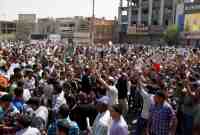
Getting to the fight we want
Nice piece in the NYT at the end of September pointing out that the primary impact of the Arab Spring is that, in giving people chances to rule themselves and not be subject to dictators, Islamic activists find themselves splintering from within:
The debates are deep enough that many in the region believe that the most important struggles may no longer occur between Islamists and secularists, but rather among the Islamists themselves, pitting the more puritanical against the more liberal.
The secularists are the Western stand-in here, and it’s often been our absurd expectations about their immediate ascension within democracy that has led us to define subsequent political outcomes as failures – namely, we topple Saddam Hussein in Iraq in an attempt to lay a “big bang” on the region and we don’t seem to end up with secularists carrying the political day. Instead we get “avowed Islamists,” meaning merely that political activists in an Islamic society naturally want their governance structure to reflect that reality, just like “Judeo-Christians” in the U.S. want a certain reflection in our government. We saw that as failure in Iraq and we see it now as failure in the Arab Spring, but the reality in both situations is what is truly triggered by these tumults is a fight within Islam itself. What publics want is a polity that encourages a devout life but simultaneously makes economic progress happen – and that will be a magnificent compromise that ultimately gets us the alleged “reformation” of Islam in response to globalization’s destabilizing embrace.
You want your “win”? There it is. We can trigger its dynamics by our actions but we cannot control its course or timing. All we can trust is that people want better lives for themselves and their children, and they can see those better lives unfold for those societies that open themselves up to globalization, which is the real battleground driver here – not terrorism nor America’s “war on terrorism.”
When we went into Iraq, we triggered the violent version of this struggle: al-Qaeda had its day and proved itself to be exactly what it is – puritanical and blood-thirsty to the point where mainstream Islam really doesn’t want anything to do with its vision. With the Arab Spring, we’re getting the political version of the same fight, but – again – it’s exactly the one we seek to trigger in the Long War – not West versus Islam but pragmatically devout Islam versus impractically fundamentalist Islam.
Short-term thinkers will always see “defeat” and “setbacks” and “disaster” and “chaos” in this path, and they will all ultimately be wrong in imagining that the friction created by globalization’s advance (America’s ultimate grand strategy for decades now) will somehow overwhelm the force of that advance. Why do they make this mistake? They assume globalization’s advance is a push function, led by the West, when it’s a pull function fueled by that global desire for a better life.
The outcome in the Long War was never in doubt, nor really America’s success in its long-term grand strategy of spreading freedom through free trade. It’s just Islam’s turn now.
From our national security perspective, the processing of this instability is preferable to delaying it by supporting dictators, because we’re just putting off what must come anyway. As for our choices on intervention, there the logic must always be to center the fight where it belongs: on the Arab Street and not on our Main Street. The Middle East has suffered a lot of civil strife since 9/11, but that is how it should be, because that is where the fight is naturally located, however much we want to make this about ourselves and our “way of life.”
Why is such knowledge important? When you know you’re just cogs in some grand historical wheel, then you get a whole lot more sensible about cutting deals when they need to be cut, walking away when you should walk away, and accepting actual “victory” when it stares you in the face – even when it doesn’t look anything like you.


